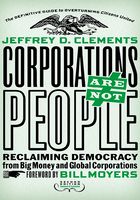
The Impact of Citizens United
In 2010, in Citizens United v. Federal Election Commission, the Supreme Court proclaimed that the American people are not permitted to determine how much control corporations and concentrated wealth may have over elections and lawmakers. The Court, in a 5-4 decision, ruled that a federal election law designed to prevent corporations and unions from dominating elections and government violated First Amendment free speech rights.
The impact of the Supreme Court’s folly now is beyond dispute. More money was spent by fewer donors in the 2012 election than ever before in history. As much as $10 billion in the federal election; billions more in state and local elections.
billions more in state and local elections. “Dark money” from corporations, billionaires, and unions was run through secretive “social welfare” nonprofit corporations acting as partisan political operatives;
“Dark money” from corporations, billionaires, and unions was run through secretive “social welfare” nonprofit corporations acting as partisan political operatives; foreign money was run through corporate subsidiaries and trade associations;
foreign money was run through corporate subsidiaries and trade associations; and Super PACs, corporations, candidates, and operatives pretending to be “uncoordinated” unleashed saturation attack ads across the land, all to drown out other issues, candidates, ideas, and, ultimately, Americans’ faith in effective democracy.
and Super PACs, corporations, candidates, and operatives pretending to be “uncoordinated” unleashed saturation attack ads across the land, all to drown out other issues, candidates, ideas, and, ultimately, Americans’ faith in effective democracy.
This spending is not “free speech,” unleashed at last, nor is it a burst of democratic enthusiasm for electioneering. Instead, it is the deployment of power of, for, and by a very few.
How few? A few dozen donors contributed 60 percent of the Super PAC money, and almost all of the Super PAC money came from came from just 3,318 donors. That is 0.0011 percent of the American population. One billionaire global casino mogul alone contributed $93 million.
One billionaire global casino mogul alone contributed $93 million. One global oil corporation alone, Chevron, handed $2.5 million to the “Leadership PAC” of the Speaker of the House, who has promised to oppose cutting oil and gas subsidies and to block action on the climate catastrophe.
One global oil corporation alone, Chevron, handed $2.5 million to the “Leadership PAC” of the Speaker of the House, who has promised to oppose cutting oil and gas subsidies and to block action on the climate catastrophe.
Almost all political contributions of any sort—80 percent—come from just 0.5 percent of the population. This “donor class,” interwoven with corporations and lobbying firms, are largely concentrated in New York, Washington, Los Angeles, Chicago, and Boston.
Political domination by the few has even overwhelmed state ballot initiatives, originally intended to check concentrated corporate and wealth power. A century ago, American government was “fast becoming a plutocracy,” and an “invisible government” of large corporations overwhelmed government of the people. Voters acted in many states to amend state constitutions, creating the citizen ballot initiative to enable more democracy to check the special interest lock on state legislatures. People in the states intended the initiative process to ensure that “this government shall be brought back to the real control of the people.”
Voters acted in many states to amend state constitutions, creating the citizen ballot initiative to enable more democracy to check the special interest lock on state legislatures. People in the states intended the initiative process to ensure that “this government shall be brought back to the real control of the people.”
Now the ideology of Citizens United has broken the check and balance of the citizen initiative. In 2012, “corporations and some of the wealthiest Americans” spent more than a billion dollars in initiatives in just eleven states, “an unprecedented explosion of money used to pass new laws and influence the public debate.” In the state of Washington, corporations such as Monsanto, Pepsico, Nestle, and Dupont spent more than $20 million to defeat a ballot initiative to require disclosure of genetically modified organisms (GMOs) in food. Of that $20 million, only $600 came from people or businesses in the state itself.
In the state of Washington, corporations such as Monsanto, Pepsico, Nestle, and Dupont spent more than $20 million to defeat a ballot initiative to require disclosure of genetically modified organisms (GMOs) in food. Of that $20 million, only $600 came from people or businesses in the state itself.
Even small cities and towns have felt the impact of Citizens United. In Richmond, California, a community of 100,000 people, a single corporation—Chevron again—spent $1.2 million to control the outcome of the city council election. Richmond Mayor, Gayle McGlaughlin, says that Chevron will spend another $2 million in city elections in 2014. A Richmond citizen serving on the city council, Tom Butt, adds, “They want a city council loyal to them. I think it’s wrong for a corporation to pour that kind of money into a local election. Nobody can match that.”
Most Americans agree, but that does not matter, according to Citizens United. Corporations and unions now have the same rights under the First Amendment as people. And if “free speech” means unlimited election spending by the powerful, that cannot be “infringed.”